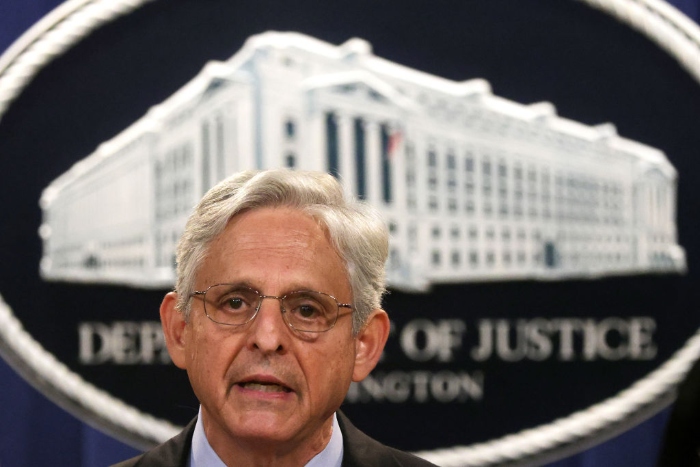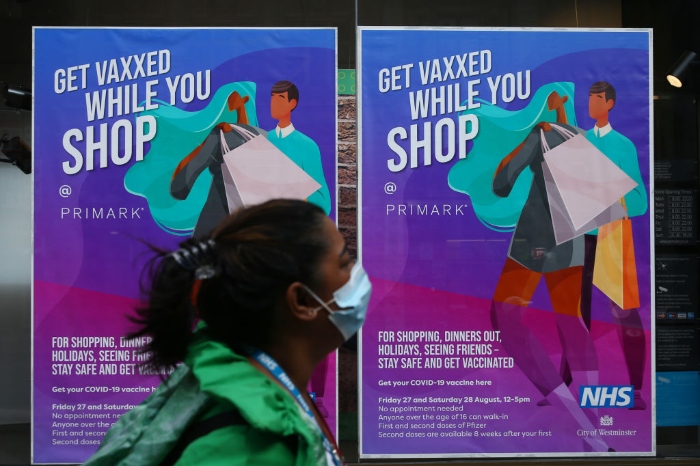| | |  | BY MYAH WARD | Presented by American Institutes for Research | With help from Tyler Weyant HOUSE CALL — The House Jan. 6 committee voted tonight to hold Steve Bannon, Donald Trump’s former chief strategist in the White House, in criminal contempt of Congress for refusing to comply with the committee’s multiple requests for his testimony. The question will next be posed to the full House, which is expected to hold Bannon in contempt on Thursday. Then it will be in the hands of the Department of Justice. That’s where things get murky. Nightly chatted with POLITICO’s Kyle Cheney and Betsy Woodruff Swan about the DOJ’s role in Jan. 6 cases and other Trump-related legal problems. These matters have piled up for Attorney General Merrick Garland, who has vowed to protect his department from partisan influence. So what’s the likelihood the DOJ decides to charge Bannon with criminal contempt? Kyle: It’s a complicated question because the legal complexities are moving in the exact opposite direction of the political complexities. Politically, and perhaps morally, the Justice Department has indicated it fully supports the Jan. 6 committee’s investigation — and it has taken steps to help it along. But deciding whether to prosecute a case of criminal contempt involves really tricky legal questions, most important of which is whether DOJ thinks it can prove Bannon’s criminal intent beyond a reasonable doubt. What looks like a slam dunk to us may not be in legal terms. And Garland is going to have to do whatever he can to prevent any decision DOJ makes from looking like it was influenced by the politics of it. Betsy: Bannon’s lawyer has also told the committee that he would comply with a court order. So prosecutors may say, why doesn’t the committee just do that, rather than escalating? Kyle: Bannon is refusing to testify by claiming that Trump, as a former president, is asserting executive privilege and legally blocking him from testifying about their conversations. This is a sweeping claim that has virtually no legal basis but does raise questions about the ability of former presidents to assert privilege over certain things they handled during their administrations. DOJ may want to wait for the answers to some of those questions before deciding Bannon has committed a crime. Do we have any read on how Garland might approach this case? Betsy: Short answer: No. Long answer: One of Garland’s very top priorities is reestablishing Americans’ confidence that the DOJ is insulated from political pressure. It might be the top priority. President Biden said last week that he thought DOJ should charge people who defy the select committee’s subpoenas, and Garland’s spokesperson released a very pointed statement indicating that DOJ did not welcome that commentary. I think it’s a stretch to try to read between the lines there. But it’s not the kind of statement you’d want to see if you’re rooting for prosecution. Kyle: We’ll find out more on this question tomorrow, by the way. Garland is testifying before the House Judiciary Committee and is sure to be asked about it. Welcome to POLITICO Nightly. Keep reading for more from Myah’s conversation with Kyle and Betsy. Reach out with news, tips and ideas for us at nightly@politico.com. Or contact tonight’s author at mward@politico.com or on Twitter at @MyahWard.
| |
| | A message from American Institutes for Research: For 75 years, AIR has used evidence to improve lives. Today, we’re applying our know-how to address our biggest problem right now—inequity. The AIR Equity Initiative is a $100 million, five-year investment in social science research so institutions can combat injustice and build bridges of opportunity for people and society. Learn More. | | | | 
U.S. Attorney General Merrick Garland speaks during a news conference at the Department of Justice in Washington. | Alex Wong/Getty Images | To what extent, if any, does Biden have control over how the DOJ approaches this? Betsy: Biden made a real problem for himself with that comment. Reestablishing norms surrounding DOJ also involves reestablishing norms for the White House. And it’s not normal for presidents to say that they think specific people (or, in this case, very small groups of people) should be charged with crimes. Obviously Trump blowtorched a lot of those norms. But the Biden administration’s self-imposed standard isn’t “better than Trump.” It’s “independent DOJ.” And commentary from the president endorsing as-of-yet nonexistent prosecutions undercuts those efforts. This isn’t the only Trump-related problem on Garland’s plate. What are the major ones that stand out to you? Kyle: The Biden DOJ surprised a lot of people by continuing to fight some of the Trump DOJ’s legal battles, including its effort to protect Trump from a defamation suit by E. Jean Carroll. But DOJ has also moved to quietly and quickly resolve a few other Trump-era issues. It negotiated a settlement to give former FBI deputy director Andrew McCabe his pension, ending a multi-year legal feud, and it’s working with committees of Congress to facilitate turning over Trump’s tax returns from the IRS. DOJ has already played a big role in Jan. 6 investigations by working with Biden to waive various privileges to permit former Trump DOJ officials to testify about the former president’s effort to overturn the 2020 election. Why are some Trump critics, who want to see the DOJ investigate Trump and his administration, worried about Garland? Kyle: He clearly doesn’t want his tenure to be defined by Trump, so he hasn’t personally engaged on a lot of questions about Trump. He very much wants to emphasize that decisions about those matters and cases are made by career professionals without an axe to grind. But he’s also put a lot of DOJ’s muscle behind prosecuting the Jan. 6 cases — now the largest criminal investigation in the department's history. What should we make of the debate about Biden’s ability to waive Trump’s executive privilege? Kyle: There’s a prevailing belief in legal circles that only the current president — the current executive — has the right to assert executive privilege. There’s only one president at a time. But there’s a complication: the Supreme Court has ruled in a Nixon-related case that former presidents are due some degree of executive privilege. If the goal of executive privilege is to allow advisers to give candid advice to the president, it wouldn’t do a lot of good for that shield to suddenly go out the window once the president leaves office. The problem is, the courts have never defined precisely what the extent of a former president’s privilege is and how to address it when the current president disagrees. Betsy: It’s super interesting because the outcome is not totally predictable. Most experts I’ve spoken to say only a sitting president can assert executive privilege to block Congress from getting records. But that’s not a total consensus. And the federal judiciary has become much more conservative since 2016, so some rulings (for instance, SCOTUS on the Texas abortion law) have been pretty surprising to court watchers. I think it’s most likely that the courts will side with Biden on this one. But I’m not quite as certain of that as other people are.
| |
| | INTRODUCING CONGRESS MINUTES: Need to follow the action on Capitol Hill blow-by-blow? Check out Minutes, POLITICO’s new platform that delivers the latest exclusives, twists and much more in real time. Get it on your desktop or download the POLITICO mobile app for iOS or Android. GET A FIRST LOOK AT CONGRESS MINUTES HERE. | | | | | | | | 
Climate activists with the group Shutdown DC protest at The Wharf near Sen. Joe Manchin’s yacht in Washington. | Anna Moneymaker/Getty Images | ʼTIS BUT A SCRATCH — In “Monty Python and the Holy Grail,” King Arthur attempts to pass the Black Knight, with the knight responding, “I move for no man!” and “None shall pass!” A battle ensues, with Arthur cutting off various extremities of the Black Knight, while the knight insists he still has a chance at victory. You may get a similar experience by simply reading about Joe Manchin’s negotiations with the Biden administration over its proposed Clean Electricity Performance Plan, the heart of Democrats’ efforts to cut carbon emissions by paying utilities to increase their use of renewables and fining those that don't. Perhaps the question is: Is the CEPP the Black Knight, or King Arthur? And if it’s dead, then what next? To clarify matters, Nightly’s Tyler Weyant spoke with energy editor Matt Daily on the CEPP and what’s to come: There are conflicting reports about the Clean Electricity Performance Plan, and whether it is alive or dead. To steal a line from Monty Python, has it only sustained a flesh wound, or is CEPP in real trouble? Our latest intel on this puts it pretty much in the latter category. Maybe think “Weekend at Bernie’s” rather than “Holy Grail” — they may be carrying it around, but don’t leave it in the sun too long. Minnesota Sen. Tina Smith, who was the big advocate for the CEPP, has indicated it’s time to move on, so that may be the end, and even some of its most optimistic supports seem to be giving it up. But in Washington, many things thought dead can come back to life — once everything else has failed. Why are we seeing so much confusion on the status of the climate plans in the reconciliation bill? Passing things that can promote climate friendly solutions, like solar or wind power, can attract a lot of support because they offer opportunities for states and businesses to grow. (Although they are frowned on by free-market advocates and supporters of rival energy sources.) But things like the CEPP included a penalty for utilities that failed to add more carbon-free power. That’s a penalty that would hit some industries and states fairly hard. That means political opposition. And when you’re trying to get a big goal — cutting U.S. carbon emissions by at least half by the end of the decade — there’s going to have to be both carrots and sticks. Balancing those is extremely difficult. Morning Energy reported this morning that green advocates were trying to figure out what could get 50 votes in the Senate should CEPP fall to reach that number. Do you see any program or set of initiatives that could pass and also achieve their climate goals? With a powerful player like Manchin, who represents a conservative coal and natural gas state, it’s going to be hard. The tax incentives that Sen. Ron Wyden is drafting with the House Ways and Means Committee are looking like they will be the biggest element, and they could really cement renewables as the key source of energy by the end of the decade. Anything else substantial may face significant headwinds — and could require something that benefits West Virginia specifically, like spending on geothermal energy (which the state has lots of) or other types of stimulus. The messaging is changing very quickly — we’re getting wildly different assessments almost by the hour, so things are in flux. But in Washington, that sometimes is a good indication people are talking and trying to make deals. That can lead to real breakthroughs, and we know the Democrats are pinning A LOT on getting this over the finish line.
| |
| |  
| | | | | — Mayorkas tests positive for Covid: Homeland Security Secretary Alejandro Mayorkas, tested positive for Covid-19 today, according to a DHS spokesperson, who said Mayorkas was fully vaccinated . “Secretary Mayorkas tested positive this morning for the COVID-19 virus after taking a test as part of routine pre-travel protocols,” spokesperson Marsha Espinosa said in a tweet. “Secretary Mayorkas is experiencing only mild congestion; he is fully vaccinated and will isolate and work at home per CDC protocols and medical advice. Contact tracing is underway.” — Cruz puts hold on Biden’s pick for Middle East lead at State: Sen. Ted Cruz (R-Texas) has put a hold on Biden’s pick to lead the State Department’s Middle East bureau, according to an email obtained by POLITICO, escalating the Texas Republican’s battle with the administration over diplomatic nominations and opening a sensitive new policy fight. In the email, Cruz’s team explained to Senate Foreign Relations Committee GOP offices why the lawmaker was seeking to delay the panel’s approval of Barbara Leaf, a top Middle East National Security Council official nominated to be the assistant secretary of State for Near Eastern affairs. According to the email, Leaf didn’t answer three of Cruz’s written questions to the senator’s satisfaction, and in one case Cruz’s team claims the NSC official lied. Leaf didn’t respond to a request for comment. — Nebraska GOP Rep. Fortenberry indicted: A federal grand jury indicted Rep. Jeff Fortenberry today, alleging that the Nebraska congressman concealed information and made false statements to authorities . The Justice Department said that Fortenberry repeatedly lied to and misled authorities during an investigation into illegal contributions to his reelection campaign that were made by a Nigerian-born billionaire, Gilbert Chagoury. — Crypto investing wins SEC approval, triggering consumer group uproar: The Securities and Exchange Commission is beginning to bless the first widely available investment funds that track Bitcoin, opening a rift with watchdog groups who argue increased exposure to the volatile market puts consumers at risk. The SEC has signaled that it won’t block industry proposals to launch exchange-traded funds based on Bitcoin futures contracts as regulatory deadlines come to pass this month. The proposed investment vehicles would not be made up of Bitcoin directly, but when the first fund begins trading on the New York Stock Exchange early this week, it will be a landmark moment for the booming cryptocurrency market. — Meet the EU’s first lady: The EU officially has a first lady: Amélie Derbaudrenghien Michel. For weeks, European Council President Charles Michel has declined to say if he and his longtime partner had finally married . But Derbaudrenghien Michel has now answered the question — and made her official debut — by inviting other European Council spouses to a “partner event” during this week’s leaders’ summit.
| |
| | BECOME A GLOBAL INSIDER: The world is more connected than ever. It has never been more essential to identify, unpack and analyze important news, trends and decisions shaping our future — and we’ve got you covered! Every Monday, Wednesday and Friday, Global Insider author Ryan Heath navigates the global news maze and connects you to power players and events changing our world. Don’t miss out on this influential global community. Subscribe now. | | | | | | | | |
| | | It’s October. So Nightly asks you: What’s your biggest pandemic fear right now? Share your responses using our form, and we’ll include select answers in Friday’s newsletter.
| | | 
A pedestrian walks past a poster advertising in-store vaccinations at Primark on Oxford Street in London. | Hollie Adams/Getty Images | U.K.’S TROUBLE WITH THE CURVE — Waning immunity provided by coronavirus vaccines combined with the U.K.’s early reliance on the Oxford/AstraZeneca vaccine has contributed to a spike in cases, which are close to reaching the 50,000-per-day mark, one of the county’s top epidemiologists said today. The U.K.’s speedy rollout of vaccines has meant that those vaccinated early on are now experiencing waning immunity, Neil Ferguson, director of Imperial College London’s MRC Centre for Global Infectious Disease Analysis, told the BBC’s Today program. “How early we were means we were a little bit more vulnerable,” he said. The country’s reliance on the Oxford/AstraZeneca vaccine that “protects slightly less well than Pfizer against infection and transmission” is another factor in the increase in cases being seen in the country. Coronavirus case numbers in the U.K. continue to rise despite 67 percent of the population being fully vaccinated. However, other European countries with similar vaccination coverage, such as France, are not yet seeing a rise in cases.
| | OPINION | TWITTERLESS TRUMP STILL TWEETS — In a classic bit of counterprogramming, Trump took the position that no other prominent commentator wanted to go near, senior media writer Jack Shafer suggests. In Trump’s formulation, Colin Powell wasn’t a hero, he was a fool. In one of the “statements“ Trump issues in hopes it will be reposted on Twitter — from which he is permanently banned — and become Topic A in the news media, Trump blistered Powell as a “classic RINO” who dragged us into the Iraq war and slagged the press for treating him in death “so beautifully.” Trump’s sulfurous elegy worked as designed as the media chorus united to scold him for violating the no-speaking-ill-about-the-newly-dead conventions of modern manners and meta-analyses , like this one, assembled themselves to explain the ex-president’s strategy. In Trump’s defense, the graveside broadside was at least consistent with his previous comments on Powell. In 2020, when Powell defected from his Republican Party colleagues to endorse Joe Biden for president, Trump called Powell “a real stiff who was very responsible for getting us into the disastrous Middle East Wars.” The only purely naughty thing Trump did was hit somebody who couldn’t hit back. It wasn’t as much a Trumpian low-blow as a rabbit punch to a defenseless bunny. If Trump had thought it necessary to justify himself, he could have claimed he was only telling the truth, adopting the position first articulated by I.F. Stone that “funerals are always occasions for pious lying.” But neither remaining consistent nor tweaking convention were Trump’s primary objective. After all, nobody needed Trump to remind them that Iraq was Powell’s great failure; it was one he had acknowledged himself. That corrective sentiment could be found in most of the ledes of the obituaries and assessments that came spilling out. The AP even moved a story that dealt exclusively with the special hatred Iraqis still harbor for Powell for his role in pushing the invasion. So the post-mortem smear didn’t illuminate Powell. But it did help explain something true about Trump. Without Twitter, without chyron to chyron coverage from Fox News, and without a pulsing presidential campaign to boost his messages, Trump depends on his shock-jock skills to elbow his way into the public sphere and on to the front page. Wicked mugging like this may look brainy and calculating, but it’s a good bet that for Trump, swinging wildly when nobody pays attention to him has become his first instinct. Shouting through a megaphone to reach the cheap seats is also a technique he uses in court, too, filing ridiculous lawsuits against Facebook, Twitter and YouTube, to overturn election results, or to punish his niece Mary Trump. His grandstanding shouldn’t work after all this time, but it still does.
| |
| | A message from American Institutes for Research: AIR is applying its know-how to address the biggest problem we face right now—systemic inequity. By investing over $100 million in social science research over the next five years, AIR’s Equity Initiative will build and use evidence that can guide policy and improve the lives of people and communities.
But we won’t do it alone. The AIR Equity Initiative will work side-by-side with partners and stakeholders, bringing together expertise and diverse viewpoints so we can create sustainable change.
Systemic inequity is a formidable challenge, but we believe in the power of evidence to bridge the gaps that are holding us back. With research and collaboration, we can improve lives across our country—now and into the future.
Learn More. | | | Did someone forward this email to you? Sign up here. | |
|
| | Follow us on Twitter | | | FOLLOW US
|
| |

No comments:
Post a Comment